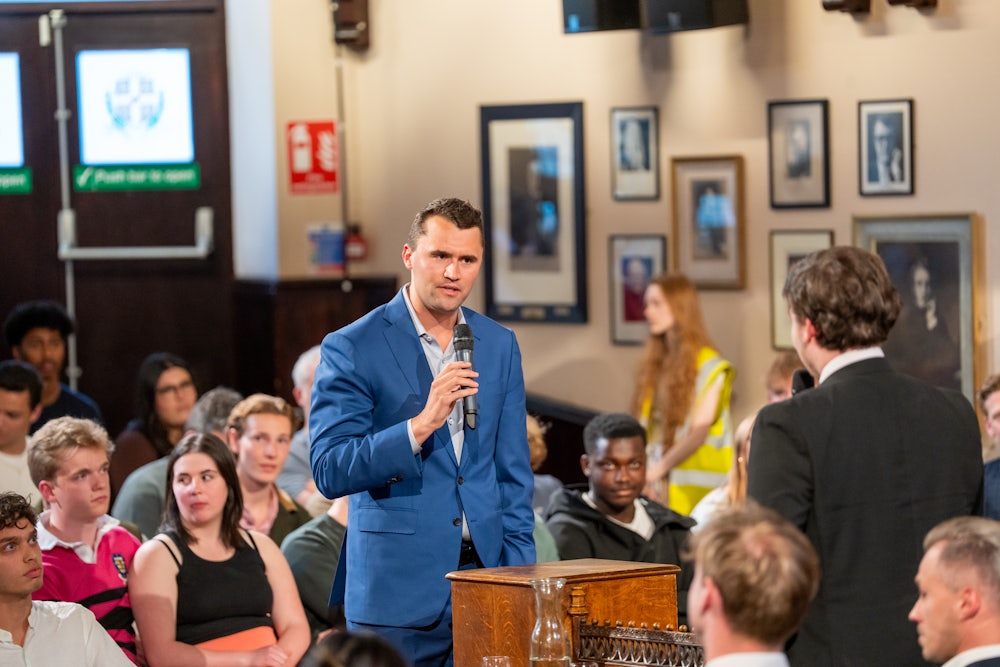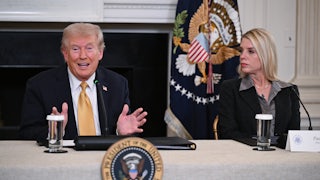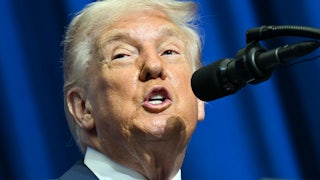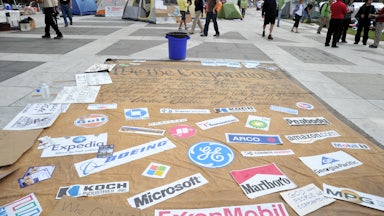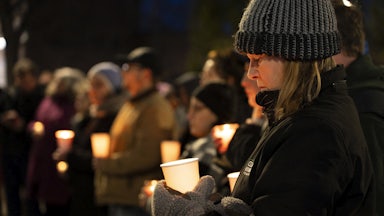The scene is familiar: a campus auditorium bristling with hired security and raised cell phones, a lectern bathed in hard light and flanked by university crests and sponsor logos, a line of students at the mic—some earnest interlocutors, others rehearsing a confutation for their social media feeds—while the marquee speaker works the room with a practiced smirk and a repertoire of gotchas engineered to go viral by morning. This outrage-packaged-for-attention market that incentivizes mockery and monetizes contempt is the roadshow that made Charlie Kirk famous—an old playbook Dinesh D’Souza and David Horowitz ran before him, now optimized for an algorithmic age: a ritualized antagonism, audience participation as culture-war cosplay, the triumphant edit pushed out to millions before the house lights are up. Strip away the self-flattery of a university crowd congratulating itself on its open-mindedness, and the illusion that a staged confrontation with a celebrity provocateur constitutes pedagogy, and what remains is a reel factory masquerading as a public forum.
The purpose of such displays has never been enlightenment. The conservative of the moment hitting the campus speaking circuit has been a fixture for decades—Ann Coulter in the early, protean cable era; Milo Yiannopoulos in the Breitbart-to-Berkeley moment; and now Daily Wire figures like Michael Knowles and Matt Walsh. What distinguished Kirk from the herd wasn’t originality but scale. Turning Point USA built a national feeder network of clubs and events, staged Q&A’s for sound bites rather than dialogue, and yoked the tour to watchlists, merch, email capture, and donor cultivation. The aim wasn’t education but pipeline: bodies in seats today, list building and voter recruitment tomorrow. That is why holding it up as a civic model feels so misplaced. The wish for liberal analogues (durable youth institutions, organizing muscle, community presence) is defensible. As Ezra Klein put it in a New York Times column he posted the day after Kirk’s shooting, widely derided for the assertion that Kirk was “practicing politics in exactly the right way”: “I envied what he built. A taste for disagreement is a virtue in a democracy. Liberalism could use more of his moxie and fearlessness.” But the lines should stop us short. Wanting organizing capacity is one thing; canonizing a machine that converts attention into activism while eroding understanding is another. Klein has been around long enough to know the difference.
Across the liberal commentariat, including in the Times’ own letters, readers balked at calling Kirk’s style “the right way.” And as many scrupulously documented—Jamelle Bouie at The New York Times (Klein’s colleague), Ta-Nehisi Coates in Vanity Fair, Chris Stein at The Guardian—even granting Kirk his better moments of empathy and grace, too much of his on-air work amounted to stigmatization rather than civics. On air, he said of airline diversity efforts: “If I see a Black pilot, I’m gonna be like, ‘Boy, I hope he’s qualified,’” a line that invites listeners to treat Black accomplishment as suspect and to recode diversity initiatives as both a public-safety hazard and an assault on the presumption of white merit. He urged that, “We need to have a Nuremberg-style trial for every gender-affirming clinic doctor … immediately,” turning the machinery of punishment toward trans clinicians and the families they serve. He trafficked for years in “great replacement” rhetoric—an anti-immigration conspiracy theory with antisemitic roots that accuses shadowy elites, often Jews, of importing migrants to “replace” white voters and culture in order to secure permanent political power—and used racialized phrases such as “prowling Blacks,” while casting Islam as incompatible with the West. He also presided over Turning Point USA’s Professor Watchlist, criticized for prompting harassment of named faculty. To the left-of-center commentators curating his record, the conclusion was not charitable. But it was, in their view, warranted; a montage pressed into an epitaph—uncharitable by design, meant to cement the public memory of the man.
On the right, the montage ran differently: Where the left compiled lowlights, supporters stitched highlights—“owns,” yes, but also vignettes meant to attest to public-spiritedness. Kirk walked confidently into hostile campuses, weathered combative Q&As calmly, and, in a widely circulated clip, explained that “when people stop talking, that’s when you get violence,” casting argument as a dam against escalation. They circulated candid family footage to hold him up as a doting father and loving husband as well as a tireless debater. Sanctification gathered speed. President Trump announced he would posthumously award Kirk the Presidential Medal of Freedom, and Republicans pushed a House resolution honoring his life and condemning political violence. In this telling, the rough edges were scrubbed or reframed as necessary provocation, and the most inflammatory lines were denied outright. Vice President JD Vance, guest-hosting Kirk’s show, demanded acknowledgment that Kirk did not say Black women “do not have the brain processing power to otherwise be taken really seriously”—technically correct as a matter of quotation mechanics—even as Kirk’s tendentious account of affirmative action still casts prominent Black women as occupying “stolen” slots.
But when taking the measure of a man, there’s a difference between charitable interpretation and moral exoneration, between admiring stamina and blessing a suspect method. When the publicly documented record includes racial insinuation, anti-LGBTQ derision, “replacement” talk, and an intimidation watchlist, the volume of evidence becomes the verdict. The manner of a man’s death, however indefensible, cannot launder the content of his life’s work. Martyrdom is not absolution.
And this montage logic—reducing lives to a binary, saints and sinners by reel—has wider costs, eroding the habits of judgment a democracy needs. Once codified in carefully edited clips, the caricature becomes the curriculum. The montage transforms a person into an avatar—a saint to venerate or a sinner to scorn—and audiences learn to choose sides before they’ve formed reasons. In that polluted information ecosystem, the obscene becomes thinkable: Charlie Kirk was murdered—not only a capital crime and a civic desecration, but the perverse, morbidly predictable logic of reducing a man to nothing more than his worst utterances.
Hannah Arendt had a name for the mental habit this stance requires: Gedankenlosigkeit, or thoughtlessness—not rank stupidity, but the refusal to think from another’s standpoint or to exercise judgment. As the late media critic Neil Postman warned, when politics is routed through entertainment, audiences are trained to react, not reflect. In that register, even an assassination is received as content; the horror presents itself as just another installment of the show. The online cheering and mockery were a moral disgrace—but proof that the performative impulse can easily eclipse regard for inherent human dignity. This is the snake eating its own tail. A culture that reduces politics to performance breeds contempt; contempt sanctions dehumanization; dehumanization invites the fantasy of erasure. Justice requires condemning the killing; judgment requires acknowledging, aloud, when rhetoric being platformed denies equal standing to neighbors—precisely the acknowledgment Klein withheld while praising Kirk’s “right way.”
Civility Without Context Is Evasion of Responsibility
“If liberty means anything at all it means the right to tell people what they do not want to hear,” George Orwell wrote. The unwelcome truth is that it isn’t whether a right-wing figure may speak, but that much of the speech at issue demeans fellow citizens. Editorial courage in this climate is not applause for debate as such. It is the willingness to say, plainly, when “the right way” is not right—and to design platforms that make that judgment legible. The instinct to defend the norm against political violence and to lower the temperature is honorable and necessary in any plural society. But lowering the temperature is not the same thing as exercising judgment. And judgment is what platforms owe.
Klein’s 2018 clash with Sam Harris over the platforming of Charles Murray sets the proper benchmark. Murray—best known as co-author (with Richard J. Herrnstein) of The Bell Curve (1994), which was excerpted in The New Republic alongside staff dissents—has long advanced claims linking measured IQ differences among racial groups to heredity, a line of argument widely criticized as scientific racism as it rationalizes entrenched socioeconomic hierarchy and supplies an intellectual legitimation for withdrawing social investment, stripping civil rights protections, and discarding the egalitarian promise of equal opportunity. Variants of this race-and-IQ politics have circulated on the American right for decades and now find fresh oxygen online. In 2017 Harris, the noted philosopher and critic of religious belief, hosted Murray for an uncritical, rehabilitative conversation, presented as “forbidden knowledge” suppressed by political correctness and prefaced with the claim that there was “virtually no scientific controversy” left to adjudicate. No psychometricians or population geneticists were present to contest the premises, no historians of race science to supply the record, no affected voices to name the predictable policy uses to which such claims are put. The format—two high-profile contrarians exploring a combustible thesis in a vacuum—was precisely the setup Klein objected to.
Klein’s standard was explicit: Bring the record, engage the live scientific disputes, and bring the missing voices into the room—because platforming is never neutral; it decides who is centered. Identity politics isn’t limited to minorities; identifying with the embattled intellectual is majority identity politics by another name. Klein chided Harris for his unwillingness to accept the structural weaknesses in his platforming architecture. As he put it, these debates cannot be staged “without voices who are expert on that subject, and who hail from the affected communities.” Ideas have consequences—a conservative watchphrase since Richard Weaver’s 1948 book—and liberals should take it seriously on the terrain they control, not by suppressing speech, but by designing platforms that import the record, the disputes, and the harmed. By saying, to the guest’s face, where the harm lies.
Measured against that standard, Klein’s 2025 stance falters. While his column rightly condemns political murder, it elevates Kirk as a civic exemplar and, with that confessed “commonality,” substitutes professional fraternity for moral judgment. It privileges solidarity with a fellow talker of politics over the substance of what was said, and over those Kirk’s rhetoric demeaned.
Which is why Klein’s choice of Ben Shapiro as the next marquee guest on his podcast, right after the Kirk shooting, really matters. Shapiro’s new book, Lions and Scavengers, casts American society as a morality play between virtuous “Lions” and parasitic “Scavengers,” with envy crowned “the most dangerous force in America.” His vision would shock the conscience if it weren’t so plainly derivative—reheated Ayn Rand crossed with Paul Ryan’s “makers vs. takers,” shot through with Sumner’s Social Darwinism and a pop-Nietzschean cult of strength, flirting with the same macho romanticism the online fringe now peddles—and delivered in a register familiar to readers of moralizing fantasy and pulp sci-fi: tidy species, heroes, and carrion.
Shapiro’s frame elevates “makers” over “looters,” recoding democratic demands as predation by lesser citizens on their betters. In practice, that worldview licenses movement building by stigmatization—very much of a piece with Kirk’s repertoire of culture-war maximalism and the reflex to treat entire groups as pathologies rather than equals. It serves the same end as Murray’s race science: the legitimation of hierarchy—Murray by (contested) heredity, Shapiro by moral sorting. Although Klein surely finds this vision risible, he offered only token pushback and a brief defense of the social-democratic left (Bernie Sanders, Alexandria Ocasio-Cortez)—and he stayed chummy with Shapiro in a way he never would have been with Murray.
Stewardship Must Triumph Over Spectacle
Challenging a line or two inside a chummy format is little more than fact-check pantomime, the performance of scrutiny with none of the rigor. It signals seriousness while leaving the audience with the impression that the differences are ideological rather than moral, that the right answer to dehumanization is to speak more softly to it. Worse, lowering the heat in the studio often raises it outside the room. Viewers are told to prize civility while watching politicians and pundits lie, mislead, and dissemble without consequence; the gap between polite banter and public harm curdles into resentment. The trolling and half-truths must be met in the moment lest they metastasize in the feeds, producing an economy that packages its wares for audiences curated by shared hatreds. If we invite those whose programs obstruct a common life of equal dignity—deepening inequalities, narrowing rights, and multiplying suffering—we owe the public more than cordiality. A conversation that ends without fists is the minimum, not the model. Keeping the peace is necessary; calling it “exactly the right way” is an abdication.
Civility-theater liberalism is not enough, whether it’s the staged heat of campus showdowns or the cool civility of podcast tête-à-têtes. The duty is twofold: Design a forum that can carry facts, history, and counterargument into the room, and host it with someone who has done the homework to press, correct, and judge in real time. When a platform is given to arguments that narrow the circle of equal regard, pair the marquee guest with the scholar who can supply the record and with those who live with the downstream effects—the policies those arguments license and the resentments they cultivate. If the host can meet the standard, let them; if not, choose one who will—or don’t stage the show. If the format can’t do that, if it launders or airbrushes dehumanization, then don’t use it. If the platform can be rebuilt, rebuild it; if it can’t, retire it.
Building an information infrastructure like this will not be easy. It asks for coordinated buy-in—from newsroom editors and bookers, podcast hosts and producers, public intellectuals and columnists, university deans and student organizations, debate societies and conference conveners, philanthropies and civic groups that underwrite public forums. But it is necessary because America’s present moment is precarious, marked by a rising tolerance for politically motivated intimidation and attacks, and by an information market flooded with bad stock.
Simply saying “more speech” will not do. An ecological metaphor serves us better than a market one: Ideas flow through an online stream with few gatekeepers, where everyone dumps their waste. Adding fresh water to a cesspool does not purify it. The work here is not governmental censorship but private stewardship—editorial design and curatorial responsibility. Don’t grant free and unfettered access to long-standing garbage-dumpers without meaningful challenge and correction. The problem compounds when the young, with little ability to distinguish vetted knowledge from confident fabulism, meet “the other side” for the first time because a host has imported that viewpoint simply to gain more reach. If you’re going to expose your audience to that guest, the framing, the record, and the counters must travel with them. Otherwise you’re not informing; you’re onboarding.
This is not pedantry. It is the substance of liberal responsibility. Politics is more than the absence of bullets; it is the quality of speech that fills the space bullets might otherwise occupy. Ideas may not pull a trigger, but they draw the lines of what type of violence becomes thinkable. The twentieth century’s worst episodes did not begin with gunfire. They began with named categories—“parasites,” “vermin,” “degenerates,” “enemies of the people”—ways of talking that prepared the ground for ways of acting. And in our present, that erosion of judgment has crossed into action: attacks on Republican and Democratic officials (the 2017 Steve Scalise shooting; the 2025 murders of Minnesota Speaker Emerita Melissa Hortman and her husband), attempts against a conservative justice (the 2022 Kavanaugh plot) and a Democratic governor (the Whitmer kidnapping conspiracy), and, perhaps, the attempts on Donald Trump’s life, or at least the second one, motivated in part by the perpetrator’s views on Ukraine and Russia. On the civilian side, we’ve seen mass killings animated by far-right conspiracy theories, from Pittsburgh’s synagogue massacre to El Paso’s anti-Latino slaughter—culminating, most recently, in Kirk’s murder. The best moments in liberal modernity, by contrast, have tried to reset the moral grammar: The Reconstruction Amendments, Brown v. Board, and the Civil Rights Act recast public life around equal protection, dignity before hierarchy. To say “we argue here, we do not shoot” is a minimum. The question is what is being argued for, and what a platform helps along. Politics at its best turns enemies into adversaries under rules and accepts that conflicts over fundamental values endure, which is why the guardrails matter. The goal isn’t to anesthetize disagreement; it is to inoculate public life against dehumanizing hierarchies smuggled in as common sense.
Neutrality has a side. Camus put the duty starkly: “The writer’s role is not free from difficult duties. By definition he cannot put himself today in the service of those who make history; he is at the service of those who suffer it.” The same charge falls now on the podcaster, the news anchor, the radio host—every keeper of a microphone. Let liberal platforms prove their willingness to meet the demands of this moment—by whom they book, how they frame, and what ideas they center in the weeks ahead. The task now is not to lower the temperature, but to raise the standard.
